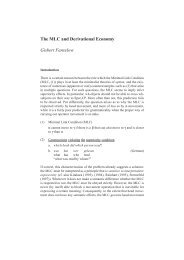Connectionist Modeling of Experience-based Effects in Sentence ...
Connectionist Modeling of Experience-based Effects in Sentence ...
Connectionist Modeling of Experience-based Effects in Sentence ...
Create successful ePaper yourself
Turn your PDF publications into a flip-book with our unique Google optimized e-Paper software.
3.3 A Model <strong>of</strong> RC Process<strong>in</strong>g<br />
Relative Clause <strong>Experience</strong><br />
Figure 2. Comparison <strong>of</strong> the Human Self-Paced Read<strong>in</strong>g Patterns at Pre- and Post-test to the GPE Patterns Obta<strong>in</strong>ed for the SRNs.<br />
Figure 3.5: Wells et al. (2009) read<strong>in</strong>g times compared to model<strong>in</strong>g results <strong>of</strong> MacDonald<br />
and Christiansen (2002)<br />
The unnatural ORC patterns are probably the reason for an experience effect over<br />
such a short <strong>in</strong>terval <strong>of</strong> only 4 weeks. 37 Additionally, unnaturalness might have <strong>in</strong>flated<br />
the clause type effect <strong>in</strong> read<strong>in</strong>g times. I suspect that a study with completely natural<br />
sentences would show a smaller clause type difference and would need a strongly extended<br />
tra<strong>in</strong><strong>in</strong>g period to show experience effects. However, this small-scale study clearly proves<br />
the effect <strong>of</strong> structural probabilistic constra<strong>in</strong>ts on read<strong>in</strong>g skill. The comparability with<br />
the SRN simulations is given by the transitivity constra<strong>in</strong>t <strong>in</strong> ORCs which is a probable<br />
factor both <strong>in</strong> the simulations and <strong>in</strong> the human study.<br />
A Detailed Prediction Analysis<br />
The assumption that the SRN ma<strong>in</strong>ly learns the verb transitivity <strong>in</strong> ORCs is, however,<br />
only speculation. Konieczny and Ruh (2003) carried out a more detailed analysis <strong>of</strong><br />
the word-by-word predictions <strong>of</strong> MC02’s SRN. They found that the high GPE scores on<br />
the embedded verb <strong>in</strong> the ORC and the matrix verb <strong>in</strong> both RC types were caused by<br />
lexical misclassifications and local coherence. In particular, see<strong>in</strong>g the ORC sequence<br />
‘the N that the N’ the SRN predicts the end-<strong>of</strong>-sentence marker EOS <strong>in</strong> early tra<strong>in</strong><strong>in</strong>g.<br />
In later epochs the activation on EOS is reduced and <strong>in</strong>creased on the correct verbs.<br />
Notably, the predictions for <strong>in</strong>correct verbs (<strong>in</strong> this case all <strong>in</strong>transitive verb plus those<br />
with non-match<strong>in</strong>g number) do not change over tra<strong>in</strong><strong>in</strong>g. This pattern is <strong>in</strong>consistent<br />
with the transitivity hypothesis. The experience-<strong>based</strong> decrease <strong>of</strong> error on the ORC<br />
embedded verb is seem<strong>in</strong>gly not caused by learn<strong>in</strong>g the dist<strong>in</strong>ction between transitive<br />
and <strong>in</strong>transitive verbs but rather by learn<strong>in</strong>g to separate the pronoun that from verbs.<br />
The other region show<strong>in</strong>g effects <strong>of</strong> clause type and experience is the ma<strong>in</strong> verb. At<br />
59
















